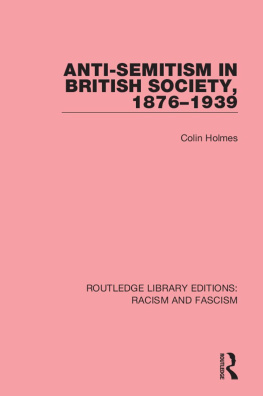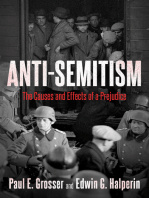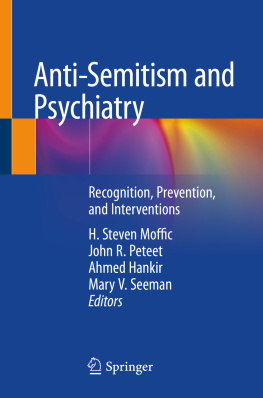ROUTLEDGE LIBRARY EDITIONS: RACISM AND FASCISM
Volume 2
ANTI-SEMITISM IN BRITISH SOCIETY, 18761939
ANTI-SEMITISM IN BRITISH SOCIETY, 18761939
COLIN HOLMES
First published in 1979 by Edward Arnold (Publishers) Ltd
This edition first published in 2016
by Routledge
2 Park Square, Milton Park, Abingdon, Oxon OX14 4RN
and by Routledge
711 Third Avenue, New York, NY 10017
Routledge is an imprint of the Taylor & Francis Group, an informa business
1979 Colin Holmes
All rights reserved. No part of this book may be reprinted or reproduced or utilised in any form or by any electronic, mechanical, or other means, now known or hereafter invented, including photocopying and recording, or in any information storage or retrieval system, without permission in writing from the publishers.
Trademark notice: Product or corporate names may be trademarks or registered trademarks, and are used only for identification and explanation without intent to infringe.
British Library Cataloguing in Publication Data
A catalogue record for this book is available from the British Library
ISBN: 978-1-138-93422-1 (Set)
ISBN: 978-1-315-66966-3 (Set) (ebk)
ISBN: 978-1-138-93752-9 (Volume 2) (hbk)
ISBN: 978-1-315-67619-7 (Volume 2) (ebk)
Publishers Note
The publisher has gone to great lengths to ensure the quality of this reprint but points out that some imperfections in the original copies may be apparent.
Disclaimer
The publisher has made every effort to trace copyright holders and would welcome correspondence from those they have been unable to trace.
Anti-Semitism in British Society
18761939
Colin Holmes
Copyright Colin Holmes 1979
First published 1979 by
Edward Arnold (Publishers) Ltd
41 Bedford Square, London WC1B 3DQ
British Library Cataloguing in Publication Data
Holmes, Colin
Anti-semitism in British society, 18761939.
1. Antisemitism Great Britain
I. Title
301.451924041 DS146.G7
ISBN 0-7131-6189-2
All rights reserved. No part of this publication may be reproduced, stored in a retrieval system, or transmitted in any form or by any means, electronic, photocopying, recording or otherwise, without the prior permission of Edward Arnold (Publishers) Ltd.
Filmset in Monophoto Plantin Light
by Asco Trade Typesetting Limited, Hong Kong
Printed in England by Richard Clay (The Chaucer Press) Limited
Contents
This book developed out of my interest in Jewish immigration into Britain, with which I began to occupy myself in the late 1960s. I was soon pushed beyond this study by the appearance of books by John Garrard and Bernard Gainer and, as a result, I turned towards the more general question of anti-semitism in Britain. It was John Davey, then at Edward Arnold, who suggested that a work which ended in 1906 which at that point was my outer chronological limit would be of less interest than one which pushed ahead as far as 1939. I accepted his challenge and the present book is a child of such circumstances.
In writing it I have incurred a number of debts which I should like to place on record. I shall always be grateful to C. C. Aronsfeld, of the Institute of Jewish Affairs, who was the first editor to commission an article from me and who, since the early days, has been generous in his help, enthusiasm and encouragement. Professor Chimen Abramsky was also helpful at an early stage of my work, particularly in relation to bibliographical detail. More recently I have benefited from my exchange of ideas with Michael Biddiss, Alan Lee and Richard Thurlow and from the general sharpening of my thoughts in seminars at different universities. My postgraduate students have also provided me with fresh insights into the problems I discuss. In particular, I have benefited from the contact I have had with Kenneth Lunn, whose thesis on the Marconi scandal is an important contribution to our understanding of rich-Jew anti-semitism present in Britain before 1914, and from my reading of Joe Bennetts detailed study of East End responses to Jewish immigration. I am also indebted to Barbara Hill for her interest, encouragement, help and criticism, all of which have succeeded in enriching a companionship which now spans a decade. Outside the academy I am grateful for the help given to me in relation to a number of obscure matters by Jan and Helena Heller and Barry Kosmin of the Board of Deputies, who helped me in a deceptively casual manner.
So much for superstructural emphases. At this point it is salutary to remind ourselves that academic work is a consumer of cash and without financial resources little can be achieved a further proof that Clapham was right in emphasizing that economic history is the most fundamental branch of history. With regard to financial help, I gratefully acknowledge the assistance of the Knoop Fund at Sheffield. Little could Douglas Knoop have realized as he speculated on the Liverpool commodity exchange the kind of works his gains would help to bring forth. In later stages of my study I was helped by a grant from the Social Science Research Council.
I should also mention that like all other historians I am in the debt of archivists, librarians and libraries. My thanks here must go to Gordon Phillips of The Times for the courtesy and consideration he has shown to me on my visits to New Printing House Square and the patience with which he has answered my enquiries. Robin Price of the Wellcome Institute has also been diligent on my behalf. I am also indebted, in various ways, to the staff of the British Library, the Bodleian, the Public Record Office, the Royal Anthropological Institute, the University Library at Sheffield and the Wiener Library, as well as the staff of the public libraries in three great northern cities at Liverpool, Manchester and Sheffield. Among individuals holding archival material I am indebted to Timothy Tindal-Robertson of the Britons for access to his file on The Protocols.
Although I alone am responsible for the details and emphases in the book, the information which was drawn from the various sources listed above was put together for me in readable form by Beryl Moore and Pat Chessum, who typed with quiet competence and a pleasing efficiency. The meticulous task of compiling the index was expertly undertaken by Vic Gilbert.
Throughout these processes of production I count myself fortunate in having as my publisher Edward Arnold, who at a time of commercial panic resisted the challenge to inject the principles of the supermarket into publishing. John Davey, who commissioned the book, and Fay Sharman and Susan Loden, who saw it delivered, maintained a continuous interest in it.
Finally, on a personal note, I wish to emphasize that the book would never have appeared without the help of my parents. I regret my father did not live to see it finished. The book also owes a great deal to the organizational efficiency of Joyce Holmes who provided an oasis of quiet in which I could work and who also found time to read and comment on the manuscript, despite all the demands made upon her by our daughter, Rachel. Since I believe there are lessons to be learnt from this book and, hopefully, the future will most fully belong to Rachel it is to her that I have decided to dedicate it, reminding her that, Wisdom is the principal thing; therefore get wisdom: and with all thy getting get understanding, (Proverbs IV. 7).










